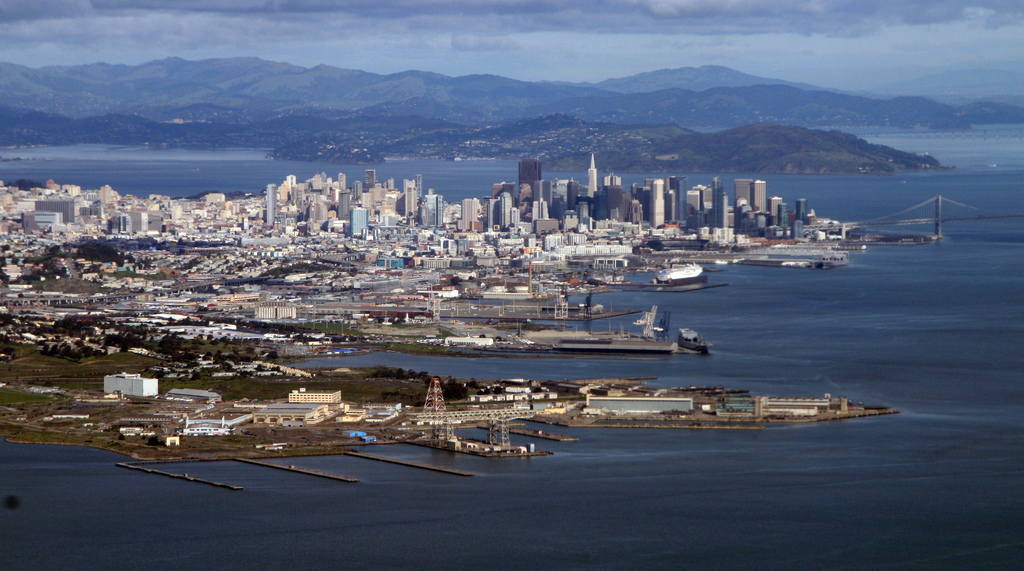Of Disability and the Garden State
Where there is ecological devastation, disability is increasingly present. But the prevailing human cultural presumption views human disability as an individual tragedy, unique and occasional. Even as we bemoan mutations in indicator species such as frogs, we seem unable to consider the effects of ecological devastation on the human community. Disability studies and ecological studies have not really addressed this shared zone of concern. Admittedly, though I wrote my dissertation in the area of ecotheology and have consequently published in disability studies, I myself have not entirely figured out how to think about this intersection.
Disability studies challenges many of the prevailing representations of disability in ecological thought and theology. Consider how our most popular ecological myth of the day, Avatar, covertly relies upon the miraculous reversal of disablement. Wheelchair-riding Jake Sully — carried through an overtly imitative Christological passage from grave to pietà on the lap of the Na’avi woman Neytiri — resurrects into somatic wholeness when his consciousness is transmitted into the Na’avi body. Even as the movie overtly problematizes technology, it emphasizes the miraculous remediation of disability. Its response to disability resembles early Athanasian Christian notions of resurrection into a transcendent other dimension. This bodily resurrection makes the story work by delivering on a culturally assumed Edenic promise of restoration to the garden — in this case a garden of idealized, ecologically wise natives — and a restoration to bodily wholeness. The movie’s director, James Cameron, reports that what sold the movie was the inclusion of the disabled Sully — a clip that was initially withheld from promotional shorts. The remediation of disability “stands in” for the restoration of a ruined earth. It delivers on an implicit ecological promise of restoration to organic naturalism, although the experience of living with disablement witnesses otherwise.
The Anthropocene as a Disabling Environment
Disability statistics have become increasingly enfolded within our narratives of environmental crisis. Noted biologist and ecological activist Sandra Steingraber recites the striking increase in the number of preterm births — considered the primary determinant of disabilities in the United States. Early births can be triggered by neurological and carcinogenic contaminants as well as by poor air quality, owing to silica and off-gases of fracking (“The Whole Fracking Enchilada,” Bioneers Conference, October 21, 2012). Barry Estabrook reports for The Ecologist on “the horrific birth defects” — specifically, tetra-amelia syndrome and respiratory systems damaged so severely as to not allow babies to live — linked to exposure to pesticides used in the tomato industry (“Chemical Warfare,” September 1, 2011). My own “garden state” variety disability, the amputation of my left leg amidst an overwhelming strep infection, may stem from nuclear particulate rained upon the bucolic pastoral lands of southeastern Minnesota in the late 1950s, then ingested in raw cow’s milk, occasioning thyroid failure and intensified by aggravation of the biotic communities through antibiotic overuse in the land of Big Pharma.
Writing recently in the Sunday New York Times, Jim Robbins concludes that many infectious diseases are a result of what we do to nature (“Man-made Epidemics,” July 15, 2012). This is to say nothing of what is yet expected to come: Ted Dracos reports that “two-thirds of all the PCBs produced are still waiting to invade the biosphere,” which means we’ll need to deal with consequent endocrine disruptions after the PCBs have been absorbed by human or animal life (Biocidal: Confronting the Poisonous Legacy of PCBs. Beacon Press, 2012: 206).
Increasingly, disability is not merely a “natural” evolutionary mutation. In the Anthropocene era, as human activity drives and aggravates planetary evolution, environmental disability is increasingly a form of human-on-human injustice. The geopolitics of ecoinjustice matter. Postcolonial theorists likewise warn that neocolonialism, like colonialism before it, generates not just cultural but environmental catastrophe. Rob Nixon draws attention to what he calls “slow violence” — the eruption of off-loaded ecological risk. Globalization of industry displaces environmental contaminants to uncontrolled zones, peppering these lands with long-term chemical residues — any number of which may occasion disability. While certain regions face more brutal dangers, chemical disruptions are not limited to industrial sacrifice zones or regions marked by war. Environmental risk spreads throughout our world’s breadbaskets. As chemical residue lingers in the soil, working its “slow violence,” it can pass through the generational folds of flesh, releasing its unnecessary mutations.
Critiquing Ecological and Theological Conceptions of Disability
Yet disability might also function within ecological discourse as something more than a metaphorical and statistical scare tactic to catalyze people’s ecological best practices. Bringing disability studies perspectives into conversation with ecotheology has the potential to transform how ecological studies conceptualizes both nature and flesh.
When ecological studies “thinks disability,” it often relies both on a discourse uncomplicated by critical disability studies discourse and a romantic naturalism. Were we to recognize the flux and provisionality of nature, we might also recognize disability as the common underpinning of all humanity. But because ecological studies has a tendency to bracket disability from its conception of “the natural,” its picture of nature often suggests an organic holism without ruptures, disruptions, or asymmetries. Despite a half-century of evolutionary theory that could presumably challenge such presumptions, disability continues to be regarded as an individual tragedy — something peculiar and outside the norm. The specular focus on the person living with a disability and the “event” of disablement overwhelm good geosocial histories and communal, contextual accountability. Given ground conditions in the Anthropocene, disability names one of the unthought aftereffects of human historical processes — even if the precise process of disablement remains hard to trace.
Once impairment has taken place, our dominant culture commonly incorporates it into the redemptive metabolism of Christianity, colonialism, and/or Western medicine — all of which conspire to fix, cure, and rehabilitate disability. Humanism presumes the superiority of certain conceptions of normalcy, suppressing the in/valid or disabled person’s agency, autonomy, and reason.
Theologians have often treated disability not only as a marginal and minority concern, but as something unearthly and extraordinarily horrific. Think of how easily we give into the fear of it, a fear, I’ve claimed, that ecological discourse is tempted to make use of. Yet disability studies theorists suggest that disability is no more and no less than what ordinary flesh experiences during a lifetime. As Rosemarie Garland-Thomson argues, disability is simply “the transformation of the flesh as it encounters world . . . the body’s response over time to its environment.” (“The Case for Conserving Disability,” Bioethical Inquiry vol. 9 [2012]: 342).
The Concept of Social Flesh: Flesh as Commons
What then are we withholding from our view of nature that makes disability stand out as a horror? Disability studies constitutes not so much an identity politics as a means of assessing cultural, philosophical, and metaphysical denials and for countering geosocial systemic amnesia. It can help us imagine a new conception of humanity from which there is no transcendental redemption.
One way in which we might redress this tendency to individualize and marginalize disability might be to think about the concept of social flesh. Flesh names something we share, tend, and conserve among ourselves as a human community. That would make the ecological event of disability something that happens to “us,” to our fleshy commons — not simply to a containable, disposable individual. Flesh as commons might help us speak more strongly of our ecological interdependence and of that which suffers loss from our ecological disregard.
Crip as Earth-assemblage
Disability frequently appears within many ecological and religious scenarios only to connote “failed health.” In a recent lecture where I challenged this portrayal, I was asked “If the crip, the person living with disability, can be the picture of health, then what am I supposed to say to the farmer considering allowing fracking on his land?” In light of my engagement with this question, in spite of my refusal to serve as ecology’s scare tactic, I have also come to wonder whether disability studies must also venture to think of disability in a more complex, less humanist manner.
First, those of us who have become disabled through ecological events might want to speak of crip pride in a way that also honors the loss, grief, and trauma through which we and our families have moved due to ecosystemic disruptions. This doesn’t negate the way I live as a crip with attitude in the face of a culture still tempted to marginalize and minoritize me.
Second, how might I allow the ecogeosocial nature of events to speak through me, without silencing the earth-assemblage that I am? Perhaps my cripped corpus speaks as an angered, enraged bacterial community. Perhaps it speaks of winds forced to carry nuclear particulate. How do I live and voice my “crip-hood” without homogenizing and suppressing the elementals that speak through me? I’m reminded of a passage in one of Hildegard von Bingen’s works in which she reports hearing the elements (water, soil, wind) protest humanity’s occlusion of their ability as elements to fulfill their vocation. As new materialism suggests, all beings, all systems, and all elementals are actors. In working with ecological discourse, I hope that disability studies will move beyond the humanist temptation to recuperate only the sovereign self of the crip — and so begin to think ourselves as earth-assemblages.
 Sharon V. Betcher is a freelance academic living on Whidbey Island, Washington, and is also an affiliate professor of theology and research and teaching fellow at Vancouver School of Theology. Betcher is the author of two academic manuscripts, Spirit and the Politics of Disablement (Fortress Press, 2007) and Spirit and Cosmopolis: Theology for Seculars (Fordham University Press, forthcoming 2013), as well as essays on ecological, postcolonial, and disabilities theologies within multiple anthologies. In recent years, she has been exploring the diverse genres within creative nonfiction and recently won first place in both a hundred-word Story Smash with her composition “Blackberry Memorial” and in the Whidbey Island Writer’s Association 2012 memoir competition with her composition “Facing Diminishment.”
Sharon V. Betcher is a freelance academic living on Whidbey Island, Washington, and is also an affiliate professor of theology and research and teaching fellow at Vancouver School of Theology. Betcher is the author of two academic manuscripts, Spirit and the Politics of Disablement (Fortress Press, 2007) and Spirit and Cosmopolis: Theology for Seculars (Fordham University Press, forthcoming 2013), as well as essays on ecological, postcolonial, and disabilities theologies within multiple anthologies. In recent years, she has been exploring the diverse genres within creative nonfiction and recently won first place in both a hundred-word Story Smash with her composition “Blackberry Memorial” and in the Whidbey Island Writer’s Association 2012 memoir competition with her composition “Facing Diminishment.”



